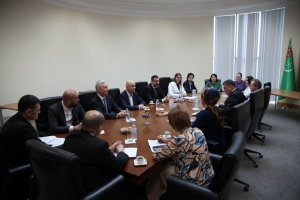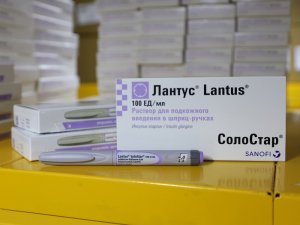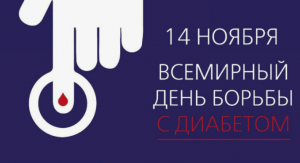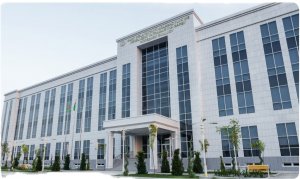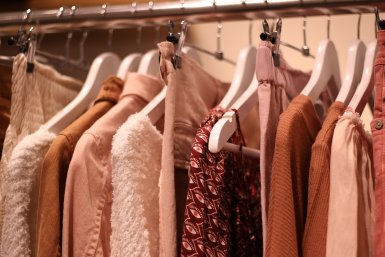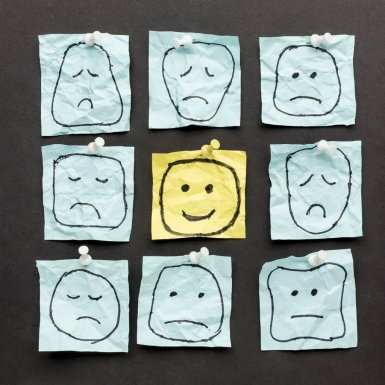Our compatriot, Dr. Akjemal Magtymova, heads the WHO office in Syria, and according to UN experts, she is one of those leaders to whom International Women's Day is dedicated this year. And not only because she is a professional of the highest class. Akjemal is always where she is needed most.
She has worked in Laos, Democratic People's Republic of Korea, Bangladesh, India, Nepal, Maldives, Yemen and Oman. She came to Syria destroyed by the war from prosperous Oman to help the country. She took with her a carpet that her mother had woven for her in her native Turkmenistan.
Dr. Magtymova, who has worked in countries experiencing conflict, admitted that she had never seen such destruction before. And then there's COVID-19. Today, about 13 thousand cases of infection have been registered in Syria.
We would like to share with you the materials of the interview given by Akjemal Magtymova to the UN correspondent Elena Vapnichnaya. The interview was published on the UN website.
Akjemal Magtymova: All these registered cases, which we are talking about now, in no way correspond to the real numbers. There are many cases, including fatal ones. There are more of them than statistics give.
There is no good level of testing, although WHO has helped and continues to help develop testing capacity. We are now talking about ten laboratories with PCR testing capabilities.
The first case of coronavirus in Syria was reported on March 22, 2020. The government already announced a curfew on March 24, and people did not go out or visit crowded places. And this helped to slow down the transmission in some way. But then other countries also began to impose curfews, economic opportunities began to close and the Syrians began to return to their homeland. By June-July, thousands of Syrians had returned. You remember that in many countries the “first wave” was in the spring - here there were only isolated sporadic cases. Only after July these isolated cases turned into clusters, and then a wave of widespread transmission by the population began, when we can no longer trace contacts.
Now more than half of Syrians, about 9.3 million, cannot say how they will continue to exist. In part, they have a choice: either to die of hunger or from COVID.
Elena Vapnichnaya: Everyone was very happy when the first vaccines appeared. And great hopes are pinned on them. But we know that, unfortunately, most of the vaccinations have been and will be in rich countries, many countries have not yet received vaccinations at all, not a single vaccine has been received for them. There is nothing in Syria yet, and even the plans through this excellent COVAX platform, which should just help those who are not able to purchase them on their own, get vaccines, are such that only 1 million 20 thousand should come, will cover only 3 percent of the population. The most vulnerable are those who are vaccinated first in all countries. Only 3%! Why is there such a situation, why is no one in a hurry to help the long-suffering country?
Akjemal Magtymova: Syria is one of 92 countries that can receive the vaccine through COVAX. You correctly said that it will be 1 million 20 thousand doses. And three percent are mostly health workers and social workers. And only then there will be other stages: the adult population over 55 years old, and then the population that has some kind of chronic diseases, who are at risk of contracting COVID-19. We do not know how many vaccines will eventually be ready and will be approved by the WHO.
Naturally, COVAX will only work with WHO approved vaccines. Now there are three of them. The Russian vaccine, Chinese and several other vaccines are under consideration by the WHO. Once these vaccines are considered, there will probably be agreements with COVAX to show solidarity with countries like Syria.
Elena Vapnichnaya: You came to Syria from prosperous Oman because you thought that Syria needed help. But then the issue of COVID-19 was not so acute, there was no such humanitarian disaster as it is now, although the medical infrastructure was destroyed, there were not enough doctors, and so on. Do you regret it?
Akjemal Magtymova: I absolutely do not regret it, Elena. I, frankly, feel very, very, very tired, probably just like everyone else - even those who have been to prosperous countries. I look at how much we have done, how we have done, what we have done, what else needs to be done. We are looking at 2020, which was a very, very serious test for all of us, for all of humanity.
2021 gives us hope. And I want to focus now on that hope. While we have not yet defeated COVID-19, we must still control and identify it. We are going to expand the testing program, improve laboratory PCR diagnostics. There are now 6 more PCR machines at the border.
All of us now - most of the people on my team, myself included - are focused on this hope, on getting vaccines, on proving that we can act and vaccinate the population.
You know, the national vaccination program in Syria is one of the strongest vertical health programs, more than 40 years old. I am proud to say that for the entire year 2020, there have not been a single case of disease outbreaks - throughout Syria, including refugee camps and other areas where the war is still going on - but not a single case of epidemiological outbreaks of diseases that can be prevented by vaccination, did not happen, despite all the difficulties.
We are now putting COVID-19 vaccination on the rails of this very strong immunization program. Of course, the adult population, not children, will be vaccinated, but we are ready to start working. We are working hard towards this, working with our partners - the United Nations Children's Fund (UNICEF) and the Syrian Ministry of Health, as well as with various partners in the northwest and northeast of the country.

